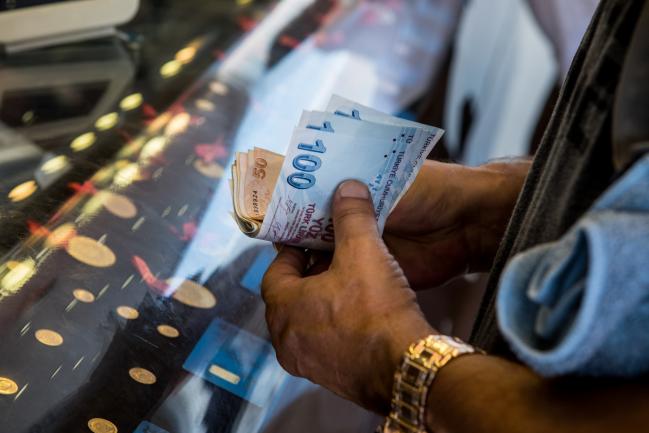(Bloomberg) -- Turkish banks moved to ease access to credit for companies as the prospect of further U.S. sanctions and a review of the nation’s debt sent new convulsions through financial markets.
In the latest steps to shield the economy from the recent rout of the lira, the Treasury and Finance Ministry said lenders would ensure credit lines to non-financial companies remained open and pricing and repayment periods kept flexible. The statement came hours before S&P Global Ratings was scheduled to announce its rating and outlook on Turkey’s foreign-currency debt, three months after it cut the nation deeper into junk territory.
The uncertainty added to negative investor sentiment already building after U.S. Treasury Secretary Steven Mnuchin again urged President Recep Tayyip Erdogan’s government on Thursday to free American pastor Andrew Brunson, whose plight plunged already strained bilateral ties into a crisis, or face more sanctions.
An appeals court in the coastal city of Izmir is set to rule by Saturday on a bid by Brunson’s lawyer to release him.
While reassuring pledges by Treasury and Economy Minister Berat Albayrak on a global investor conference call Thursday and a crackdown on betting against the currency have helped the lira rebound by around 6 percent against the dollar this week -- after losing a fifth of its value the previous week -- the prospect of renewed conflict with the U.S. again has markets on edge.
“It still looks like we’re headed to more conflict,” Kathy Jones, chief fixed-income strategist at Charles Schwab. “Neither side seems to be backing down yet.”
On Friday the lira slid as much as 8 percent before paring losses to 3.9 percent to trade at 6.0676 per dollar at 1:39 p.m. in Istanbul, bringing its decline for the year to around 37 percent.
Market turmoil was triggered when the U.S. first sanctioned two ministers in Erdogan’s government over the continued detention of Brunson for what Turkey says was his role in a failed 2016 coup. For much of this week, the currency pared losses on the back of a stealth interest rate hike by the central bank and a limit by banking regulators on swaps that cut down on short selling the lira.
Erdogan, who has rejected concerns that Turkey might need a rescue package from the International Monetary Fund, also expanded his diplomatic outreach this week, speaking to leaders of Germany and France and striking a deal with Qatari emir which will see an inflow of $15 billion into the economy.
On Friday, government officials announced a slew of measures to protect the creditworthiness of companies hurt by the weaker lira or their failure to repay debt amid the market turmoil. The Treasury and Finance Ministry, which originally announced the measures, said they were formulated by Turkey’s banking association TBB and were only recommendations for lenders.
With Turkish companies weighed down by increasingly costly foreign-currency debt --estimated at 40 percent of gross domestic product -- and confronting double-digit inflation, the S&P review provides the latest flash point.
“The market turmoil in Turkey is the latest in a series of fragilities amplified by gradually tightening financial conditions this year,” according to Wei Li, BlackRock’s head of iShares EMEA strategy in London. “Investors should prepare for further bouts of volatility ahead.”
